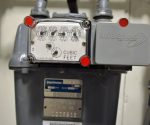National Action series; Part Four: more Army connections, confirmed and suspected
ITV news, which has had an especial interest in the subject, would have its audience believe that “National Action (NA) has hit the headlines again”. Of course, one must understand that things are not as they were in the old days when a so-called terrorist group had to blow up the Arndale Centre† for media attention. No, what ITV is referring to is the committal to jail [this week] of another handful of fantasists (and perhaps the apparent conviction of their provocateur/s), by the cunning device in legislation whereby being a member of a proscribed organisation (contrary to sec 11 of the Terrorism Act), is also to be engaged in the commission, preparation and instigation of acts of terrorism under Section 41 of the Terrorism Act 2000. In other words, nowadays it is enough to be a big deal in the news when a suspect is convicted of being a terrorist by dint of a British court finding that he is one – causing harm to life, limb or property is not necessary. Indeed, National Action has never done any of this‡ – it is, after all, a phantom menace.
Of the six people who were arrested in January 2018, three entered guilty pleas at the outset – always essential in a show trial in case a judgment cannot be wrested from a jury. These were Nathan Pryke, Darren Fletcher, and Joel Wilmore. Of immediate interest on his arrest was Wilmore (24 years old), who was described as being a former Army reservist. And on his arrest, Sky News reported:
He joined the Royal Logistics Corp in June 2011 but was discharged two years later, in August 2013, for failing to fulfil basic training obligations.
This is interesting stuff. In the second FBEL article in this series it was noted that the people tried [for NA membership] alongside Mikko Vehvilainen, styled in the media as a recruiter for National Action (but was probably, on further consideration, just a useful idiot), might have known each other through their work: i.e. they were all in the Army. Further to that, a rather lengthy BBC article, which will be referred to here frequently, titled “National Action: The new parents and the neo-Nazi terror threat” (link), relates how four National Action members in Vehvillaninen’s circle “had been, or were, attempting to join the Army”. Wilmore was one of these – as was Nathan Pryke (we’ll deal with the other two later).
If it is true that Pryke had been, or was attempting to join the army, then it must mean that he was an ex-serviceman (at 27 years, Pryke would surely be too old for a new recruit). That being said, however, fuller details do not seem to have been divulged (to be found in general in the corporate-media) – meaning that Pryke has never been in the Army, or his service is to remain a secret. There are not many clues by which to know the truth, but here is one of the best (as poor as it is): Vehvillaninen joined the Army in 2012 after a transfer, somehow, from the Finnish navy (Marines?) As Vehvillaninen was still serving in his 30s, Pryke’s career – if indeed he had one – could have been contemporary with it, and thus could have provided the basis by which they might have known each other [the BBC reports that Pryke, and Vehvillaninen and his co-defendant, Barrett, socialised together] .
There are more fascinating pieces of information indicating that a good deal of truth is indeed hidden. For instance, after leaving the Territorials, Wilmore went on to “a sensitive job as an information security expert. This involved acting as an ‘ethical hacker’ in order to test the strength of organisational IT systems” (from the BBC). From the Logistics Corps to a computer hacker? We also should notice that Pryke’s given occupation is van driver, while Darren Fletcher, 28, is a goods vehicle driver: they are both in logistics. And notice that Fletcher, Pryke and Wilmore all entered guilty pleas so that their particulars didn’t have to be raked over in a trial (for the record, Wilmore also admitted to possessing “terrorist information, namely a document called Homemade Molotov Cocktails”).
Of the six in total, three who stood trial to be found guilty of National Action membership were Adam Thomas, Claudia Patatas, his much older Portuguese “partner”, and Daniel Bogunovic (again, for the record, Thomas was also convicted of possessing a “bomb-making manual”). While the “new parents” of the aforementioned BBC article lived together in Banbury (a town the author knows well) and provided all the talking points for corporate-media coverage (Thomas was the only defendant to give evidence), there is nothing that the author can find about Bogunovic more than he is 27, and “a warehouse worker and beekeeper from Leicester”.
As just mentioned, the epicentre of this latest National Action trial was Thomas, and he provided all that was so incredibly clownish about this particular instalment of the mountain-out-of-a-mole-hill-making that is, essentially, the retailing of a fairy tale by Government. Discovered by counter terror police under a loose floorboard, just as if it was hidden contraband, a memory device with phone-photos on it: one showing Thomas wearing full Ku Klux Klan regalia wielding a machete; another showing Thomas in same garb, coddling an infant who had had the name “Adolf”ǂ bestowed upon it (out of admiration for Der Fuhrer). There was also a snap of the parents (Thomas now in civvies) sharing a proud moment with baby – and Nazi flag with swastika emblem. In another, Patatas and Thomas are joined around the same banner by Darren Fletcher, and then Thomas and Fletcher are pictured breaking out the Roman salutes, obviously because the other material wasn’t quite cartoonish enough.
Looking at these things, one can’t help wonder why there isn’t more if Thomas et al felt comfortable “play[ing]” (as Thomas called it) with provocative iconography. And why did he and Patatas feel the need to secrete the images in their own home, in a spot that was easily discoverable after all, and that only served to provide some drama to the story of its discovery? Maybe the sole purpose was to create something circumstantially incriminating.
As for real evidence that Thomas, Patatas or indeed Bogunovic were members of National Action, the author doesn’t know of any upon which the latter two were convicted – that is, he cannot find it reported in corporate-media. On the other hand, Thomas appears to have incriminated himself by a remark that had been logged on an encrypted internet chat room. (Note: where this evidence was found is incredibly significant, but we’ll arrive at this subject by and by). Some corporate-media reportage has Thomas “saying” this:
So since NA has been destroyed, the leadership generally of NA agreed it’s to be disbanded. No attempt at revival. But the Midlands branch of NA, which is just 17-20 of us, have decided to ignore this… Midlands will continue the fight alone.
Perhaps, then, there is no question that Thomas was a member of National Action after its prohibition – except that it’s completely disingenuous to attribute the above remark to Thomas, as some slightly more truthful reporting from the local BBC in Oxfordshire reveals:
Reading from the log, Mr Jameson [Barnaby, QC, prosecuting] said: “But the Midlands branch of NA, which is just 17-20 of us, have decided to ignore this and we’ve renamed ourselves the Thule Combat League#.
“Traitors. Midlands will continue the fight alone.”
Jurors heard IT experts were unable to identify which participant had sent or received each message.
Giving evidence for a third day, Mr Thomas accepted he was one of the two parties involved in the conversation but denied sending any of the messages read to court.
Asked by Mr Jameson if he had written “the Midlands will continue the fight alone”, Mr Thomas replied: “It may or may not be”.
“There’s just no way of knowing,” he said, “These are recovered messages, the whole conversation is just not here.”
Thomas certainly didn’t help himself if he stated that he may or may not have written a particularly incriminating text that experts couldn’t identify was his: this is not a denial if there were only two parties in the conversation. And one has to wonder why he did this, given that to flatly deny association with these messages is to deny the charge. But then, Thomas is quite the interesting character with the sort of intriguing back-story that one doesn’t quite know what to make of.
At school, Thomas came to the attention of the authorities and was referred to the government’s Prevent de-radicalisation programme for extremists. At 22 years old now, this means that Thomas might have been in the programme at the same time as was Alex Davies – a man who has been called a founder of National Action. Davies was referred when he was 16, in 2011 – and this information elicited the following response in a previous FBEL article: “And so Davies reminds of all those Islamic terrorists who are inevitably always known to MI5 before they perpetrate an attack.” Now we can say the same thing of Thomas.
Presumably, as part of his de-radicalisation, Thomas was taken to meet a “‘holocaust’ survivor” who had been evacuated out of Germany to England. His reaction, as he apparently told the court at his trial, was that he failed to see how she had survived the “holocaust”. From this we get a clue about the lady’s circumstances: she probably avoided the labour camps. Knowing that a lot of Jews avoided that persecution by buying their way out of Nazi Germany is, to all appearances the author can see, the height of “anti-Semitism”. Although we don’t know this lady’s particular details – and more importantly, that of her parents – the twisted logic that applies because of the inviolability of the ‘holocaust’ story and subsequent industry means that even if Thomas is technically correct, even in an assumption, he is the most grievous sort of racist. Obviously, Thomas was on the witness stand to be made an example of.
However, Thomas’ back-story continues into bizarre territory that possibly contradicts what was established with the retelling of his Prevent experience. As the Guardian reports, Thomas tried to get into the British Army – twice. He failed because of a diagnosis of Aspergers Syndrome, which is remarkable, because the orthodox medical opinion has it that this is an incurable condition. It begs the question, why did Thomas get a crack at a second application? In any case, this rejection from the British Army appears to be the explanation for an inexplicable development: at 18 years old, Thomas went to Israel to convert to Judaism so that he could join the Israel Defence Force (IDF). First of all, because of IDF entry requirements, this suggests that one of Thomas’ parents or grandparents was Jewish. There are further surprises:
The BBC has spoken to people who knew Thomas in Israel.
David Simpkins, who shared a room with him at the Machon Meir yeshiva in Jerusalem, said his roommate used the name Avi Ben Abraham.
Simpkins said Thomas had described a “horrible childhood which he characterised as a situation of constantly being bullied, growing up with far-right British extremists who were also neo-Nazis”.
Thomas disclosed that he first “started learning about Judaism to discover why he was supposed to hate them,” Mr Simpkins recalled.
He described Thomas as “extremely intelligent” but said he had “an extreme approach to Judaism” and wanted to join a small fringe group which regards most Jewish people as heretics.
“The rabbis decided that Adam needed to deal with his childhood professionally and return to convert with a clear head,” he said. “He was making the common mistake many who desire conversion make, which is to replace one psychological extreme with another.”
Avishai Grosser, who works with converts, told the BBC that Thomas, who “knew big proportions of the Torah by heart”, dropped out of several conversion programmes and eventually ended up on the streets before returning to the UK.
It is understood that after he returned, he told people in far-right circles that his time in Israel related to an involvement with the white supremacist Christian Identity movement.
Of course, the BBC doesn’t explain that the Christian Identity movement is in fact a Zionist one (being related to British Israelism). So is Thomas, or Ben Abraham, an anti-Semite, or a Zionist? Do we have some difficulty finding him to be an organic personality? Are we suspicious of his involvement in a government counter-extremism programme, then his interest in the British Army, and then his turning up in Israel to do military service? Do we feel that there are other reasons for apparent facts, and that, actually, the facts can’t be relied upon in the first place? The answer should rightly be yes; Thomas doesn’t feel “kosher” – and that’s enough in this situation to suspect him of being a cardboard cut-out – and a particularly clownish one – for this particular operation.
Moving on, and in fact dealing as promised with the issue of the chat room message evidence, and its significant source of origin: “Incriminating chat groups” reported the BBC in relation to the Thomas case, “were found on… [Alexander Deakin’s] phone, and that of another man who cannot be named for legal reasons”. Deakin, of course, is the character who features in the second part of this ongoing FBEL National Action series. As reporting restrictions are now lifted (apparently) it can be told – and this won’t come as a surprise – that he was the fellow who was on trial alongside Vehvillaninen and Barrett* who couldn’t be named for legal reasons. Why Deakin had to be anonymous in the contemporaneous court reporting is still not clear, and a matter for a lengthier discussion elsewhere. In fact, there will be a chance to explore this topic after the trial of yet another set of alleged National Action members takes place in 2019.
The focus right now must be the way that Deakin appears to have collected the evidence to incriminate, not just the suspects in the Thomas et al case, but also those in the case in which he was a co-defendant (The BBC would report that “Deakin’s ‘sloppiness’ led to three trials at Birmingham Crown Court this year” [namely Vehvillaninen et al, Thomas et al, and another that will feature in a future FBEL piece]).
The Birmingham Mail had a most illuminating account of Deakin’s arrest, and the way that the police came by evidence that he had collected:
Deakin , who ran his operations from his bedroom at his parents’ home, was found by West Midlands CTU officers hiding in a cupboard at an address in Moseley.
And the former University of Aberystwyth and University of Coventry student was reduced to telling comrades that electronic devices full of incriminating messages, images and material had fallen into the police’s hands.
In the encrypted email he sent out the day after his arrest on May 4 2017, he wrote: “That night I was staying at a friend’s house and at 0945 they let themselves into his apartment.
“I was intoxicated at the time and so acted irrationally by hiding in an airing cupboard.”
He added: “As I wasn’t at home during the raid they were able to seize the computer and hard-drive with everything therein.”
Deakin said: “Seized phone is full of texts that will mark me as an organiser.
“I can understand if you despise me for this sloppiness (it really couldn’t have been any worse if I tried) but I really need you to get back to me as soon as possible and advise me on what to do.”
A couple of things are a puzzle. The first is the casual way that police gained entry to Deakin’s pal’s flat (the author has a hunch that this other person is the one that the BBC won’t name for legal reasons). Secondly, if police had a warrant to enter and search Deakin’s parents’ home, he couldn’t prevent seizure of property if he was present if he wanted to; so, is his just a lame excuse for what was essentially his assistance in the reeling in of a large net full of useful idiots?
There are two more things to learn about Deakin that reinforce the impression the author has already formed that he might be an informant. Firstly, the BBC says that he was a regional organiser who dealt directly with the so-called leader of National Action, Christopher Lythgoe, and also a supposed co-founder of the group, Ben Raymond. Lythgoe, of course, was convicted of National Action membership in July 2018, as covered in the third part of this FBEL series. As far as the author is aware, Raymond has never been troubled by police about National Action.
The BBC says that prior to the banning of National Action, Deakin sent the following to Raymond:
We should move to radicalise these areas [working class cities], turning them into NI [Northern Irish] style sectarian ghettoes would be the first target to fermenting race war.
And this to Lythgoe (again before the outlawing):
Like the IRA and Viet Cong we’d need to have embedded local support among the communities we’d fight in; streets and cul-de-sacs would function as barracks as supportive locals would shelter us, and it would be necessary to fade into the background at moment’s notice.
What might have been going on here is injection of ideas (by an individual knowledgable of irregular warfare and its historic application) into a place where they might never have been conceived (Lythgoe, to the author at least, appeared to be a useful idiot). In other words, Deakin payed out of rope by which a hanging could take place.
In the second FBEL article in this series, it was speculated that Deakin was in the University Officer’s Training Corps – and now some information has come to light that might justify that train of thinking. Deakin, so says the BBC article, was one of the four National Action members who had been in, or was looking to join the Army (with Thomas being the fourth, of course).
And so, there is nothing in this latest instalment of the National Action saga to dispel the strong stink of the “organisation” being something that has come out of the Army – and, by dint of its nature, the intelligence agencies – and therefore of its being a hoax to create an impression of a dangerous and growing far right tendency. And if there is any doubt as to an attempt to do this, then consider the following (issued as news by West Midlands police), and ask if the appraisal is realistic – or is National Action being inflated into something that it certainly is not. Notice the evocation of the phantom menace quality: beaten for now, but never to be defeated. And then notice the actual extent of the group’s activity as it affects the public: posters and stickers. It’s a farce:
Talking about today’s verdict, head of West Midlands Counter Terrorism Unit (WMCTU) Detective Chief Superintendent Matt Ward, said: “This result is a culmination of two years of painstaking work in the West Midlands and across the country to recognise and understand the threat of National Action.
“These individuals were not simply racist fantasists; we now know they were a dangerous, well-structured organisation. Their aim was to spread neo-Nazi ideology by provoking a race war in the UK and they had spent years acquiring the skills to carry this out. They had researched how to make explosives. They had gathered weapons. They had a clear structure to radicalise others. Unchecked they would have inspired violence and spread hatred and fear across the West Midlands.
“Today’s convictions have dealt a significant blow to National Action. We have dismantled their Midlands Chapter but that doesn’t mean the threat they pose will go away.
“Others on the periphery will take on leadership roles and so I ask for the public’s vigilance − if you see this group’s posters or stickers please report them to police − where there are new cells, we will intercept and prosecute them.”
† Post 9/11, we might suspect that the Irish Republican Army was always in fact British intelligence led.
‡ Zack Davies was found guilty of attempted murder in 2015 – but while he has been called National Action in the media, he has never been charged with membership of the group.
ǂ The author doubts that a birth certificate exists that could prove this.
# The Thule Society has cropped up before – see here.
* The BBC reports:
It is understood that both Vehvilainen and Barrett have since been discharged from the Army. The other two arrested soldiers were disciplined but not discharged, although one has since left voluntarily.
As told by the second piece in this FBEL series, an initial story about five serving Army personnel quickly changed to one about four. With great interest we should note that although Barrett was acquitted, the Army saw fit to sack him.


















